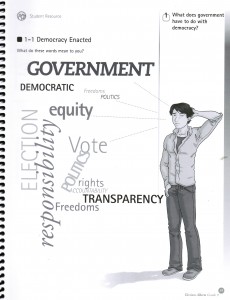Illustration by Thomas
National Democracy Challenge
Writing Category
1st place
Meagan Campbell, age 18, of Halifax, Nova Scotia has won a 128GB 11″ MacBook Air laptop for her entry:
The Resilience of Our Democracy
If we were to start an alphabetical list of the challenges faced by our democracy, we might get to ‘party discipline’ by late afternoon, ‘voter apathy’ by midnight, and ‘yes-men’ by the early morning. With a decreasing public concern for politics, the integrity and transparency of our democratic system seems to be feeble and dying. However, despite the temptation to give way to cynicism, we have just as much reason to take the opposite approach. Indeed, the resources of Elections Canada, the public’s access to technology, and our ability to learn from practices abroad mean that our democracy is wholly and thankfully resilient.
The typical argument that most optimists make states that democracy will survive because it has been ingrained in our value system since the dawn of Canada. However, this reasoning overlooks the fact that values change. Homophobia was arguably ingrained in our society in the 1900s, but we now flood the streets in pride parades each year and unanimously pass legislation that prescribes equal treatment. With this in mind, the fact that democracy is a tradition deserves nothing more than a mention. The real reasons that our democracy is resilient stem from current public and private resources in Canada, as well as ideas we can apply from elsewhere.
Canada invests millions of dollars to ensure transparent and representative polling in each election. In Nova Scotia, where I am writing from, there are twelve ways to vote, including requesting that an election official bring a ballot to your doorstep. We can view these measures not merely as a sign of desperation for democratic participation but rather as evidence of our system’s ability to adapt to an older, busier, and less politically focused population. Perhaps the epitome of Elections Canada’s efforts is seen right here in Democracy Week (although ideally, we’d have an annual Tyranny Week and dedicate the other 51 to democracy).
Canadians themselves have more ways than ever to hold elected governments accountable. The Internet means that transparency no longer relies on Freedom of Information requests, and voicing our opinions no longer depends on letters to editors. We can constantly stay updated on the decisions of our MPs and can tweet directly at them or the rest of our social networks even while the House is still sitting. As journalist Matthew Ingraham puts it, publishing used to be a business; now it’s a click. Canada is also full of organizations and media that promote democracy. We have grassroots initiatives like the Springtide Collective, which hosts panel discussions with politicians, and Equal Voice, which encourages more women to enter politics. Despite the decline in newspaper sales and funding to the CBC, online subscriptions are increasingly contributing to pay for investigative journalism. Considering that the number of Masters of Journalism programs offered in Canada has tripled since 2000, we may have a generation of Snowdens in our midst. As a journalism student myself, I can testify that persistent research and verification is constantly underway.
While Canada’s first-past-the-post system ensures that parties appeal to a wide portion of the population, we can look for polling practices oversees that could make our system all the more democratic. Mandatory voting has not proven to be particularly effective in Australia, but we can look at the systems in places like France and Scandinavia, where turnout is among the highest in the world. Perhaps children should learn about Parliamentary structure in school or go to the polling stations with their parents; perhaps members of Parliament should be required to raise an issue in the House if they receive 50 concerns from constituents about the topic, instead of the current requirement that they receive 100. Technology means that we can easily access strategies used elsewhere, and our resources give us the ability to implement them. Though our system faces a seemingly endless list of challenges, it can by all means persist. Indeed, we could just as easily start listing the strengths of our democracy though it would, no doubt, take even longer.
“Gallant would make it 6 premiers who have won provincial elections under the age 40 since 1960
http://www.cbc.ca/news/canada/new-brunswick/new-brunswick-votes-2014/jamie-gillies-new-brunswick-s-trend-of-electing-young-premiers-1.2772086
On Sept. 22, New Brunswick may elect Brian Gallant and the New Brunswick Liberal Party as the new government of the province. Gallant is 32 years old.

Liberal Louis J. Robichaud formed his majority government in 1960 when he was 34. (CBC)
If Gallant is able to win the election, this will make him the third “boy wonder” premier elected in the province since Bernard Lord upset Camille Thériault in 1999.
But it raises an interesting question: is New Brunswick out of step with other provinces and the federal government in electing such young leaders?”
 “EDMONTON — The Alberta government’s controversial fleet of airplanes will soon be gone with the wind, Premier Jim Prentice announced Tuesday.
“EDMONTON — The Alberta government’s controversial fleet of airplanes will soon be gone with the wind, Premier Jim Prentice announced Tuesday.
Prentice said the first decision of his new cabinet was to sell the four-plane fleet that had become a public relations millstone around the neck of the Progressive Conservative government.
“Effective immediately, the premier and ministers will be expected to fly commercial as the primary method of transportation,” Prentice told a legislature news conference.Operating costs have been pegged at about $9.5 million a year.
The move affects 27 union jobs, and Prentice says while he’s not sure what will happen to these employees, they will be treated as “humanely” as possible.”
Read more: http://www.ctvnews.ca/politics/alberta-government-to-sell-air-fleet-use-charters-instead-1.2009567#ixzz3DWAgA6pa http://www.ctvnews.ca/politics/alberta-government-to-sell-air-fleet-use-charters-instead-1.2009567
Private Member’s Bill
GUIDING QUESTIONS
What types of change are possible in the short term?
What types of changes could take longer?
What actions do you think are most acceptable to society in improving well-being, standard of life or quality of life?
What changes have challenges associated with them? What are these challenges?
SAMPLE TOPICS
Cyberbullying legislation
Banning junk food or bottled water in schools
Industrial development applications, such as oil, natural gas or factory farm production and environmental community impacts
The cost of higher education
Insurance rates for young adults
Labour laws relating to youth or young workers, including safety, financial impact and training standards for full or part-time workers
Community support for troubled young people
Health care issues related to youth
Young adults and Canada’s military drive
Canada’s role in the world as right or responsibility
SAMPLE BILL 1
SAMPLE BILL 2 – BEST
ACTUAL PRIVATE MEMBERS BILLS IN CANADA
Writing Your Bill Edit PAR – further reading for ideas and guidance
II.1.3.3_Introduction_of_Government_Bills_e
I.2.7.2_How_a_Bill_Becomes_Law
Rubric
TITLE /1
DEFINITIONS /3
PURPOSE STATEMENT /1
GUIDELINES AND PROCEDURES /5
REASONS FOR PASSING /2
DELIVERY /5
Party Platforms
Use the following guide to construct a visually appealing and engaging party policy manual. Your manual must include at least 3 stances. All members must contribute with their individual roles in a short bio.
HANSARD – Sept. 16
Sept. 16th – AGENDA
- Adoption of the Agenda
- National Democracy Contest 2014
- Briefing of the House- Procedure and Protocols for writing a bill
- Party Platforms & Roles – email today
- ADJOURNMENT
- Caucus Meetings
- Draft Private Member Bill & Platforms
- POST BILL TO FIRST READING
Wednesday Sept. 17th
9-1
Opening: Throne Speech from Prime Minister
Bills: First Reading
DEBATE: Should voters lose the right to vote after deciding not to cast a ballot?
9-2 Senate Committee Selections
House Adjourned
The House is currently adjourned and will resume in Ardrossan in September, 2014.
To see what’s currently happening in the Parliament of Canada, see CPAC station on your local cable network.
For more information, see http://www.cpac.ca/en/ for details.
Informed Voting
Using your Informed Voters shopping list, Compare the party platforms and fill in the boxes with the party & policy you agreed with, and why.
Political Parties



